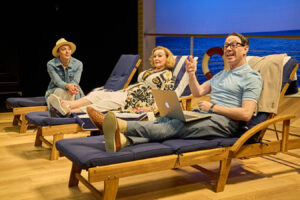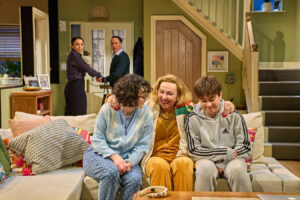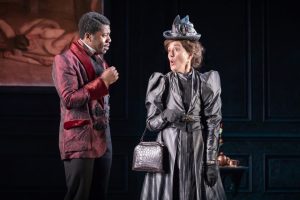Triumphant comedy debut from Doctor Who & Sherlock writer
★★★★★

What connects Doctor Who, Sherlock, The League Of Gentleman and No 9? The answer is The Unfriend, a new laugh-a-minute comedy that’s just opened at Chichester Festival Theatre’s Minerva. I’ll give you all the connections in a moment.
For now, let’s just say that Steven Moffat, writer and show runner for Doctor Who, and creator of Sherlock, has finally got round to writing a stage play, at the age of 60. It’s encouraging for we older folk to think it’s never too late, but I doubt there are many playwrights of any age who could make such a triumphant debut. It’s a long time since I laughed so much at the theatre. The man has comedy bones. He knows how to make old jokes sound fresh and natural. He understands how to give the actors the opportunity to use their faces and their bodies.
And what actors. Frances Barber is a loud confident American who turns out to be a serial poisoner, Reece Shearsmith and Amanda Abbington are the couple she befriends and who then can’t get rid of her, because they’re too polite. Although much of the praise should go to Frances Barber’s bravura performance, I loved Reece Shearsmith’s comic timing and panic-stricken face.
First the connections. Steven Moffat is probably best known as a writer and eventually showrunner for Doctor Who during the first decade or so of its new incarnation. He then created the Benedict Cumberbatch Sherlock which was co-written by Mark Gatiss who directs The Unfriend and we know him from The League Of Gentlemen, which also starred Reece Shearsmith, who cowrites Inside No.9, and stars in The Unfriend, which also stars Amanda Abbington who was Watson’s wife in Sherlock and Frances Barber who played Madame Kovarian in Doctor Who when Steven Moffat was the show runner. So they know one another and they work well together.
When Elsa arrives at Peter and Debbie’s suburban English house, you get a glimpse of their front door which has the number 9 on it. A little in-joke maybe, but it’s a hint that we shouldn’t be surprised that it turns out she’s no simple pain in the neck. They soon discover she’s a serial murderer- and they’re still too polite to chuck her out. You might think this a stretch but it’s absolutely believable, not least because they’re aware of their own embarrassment. This is a comedy of manners, literally.
It’s non stop laughter with Frances Barber, Reece Shearsmith & Amanda Abbington
mandaI suspect how much you like it may depend on how much you identify with the self-defeating politeness and embarrassment of our suburban English couple. If you are happy to complain about the service in a restaurant, talk to your doctor about intimate infections, and barter with salespeople, you may well find this plot unbelievable.
You might also refuse to suspend your disbelief because the characters seem too much like stereotypes. The overly polite Brits who won’t say what they’re thinking; the brash American who makes jokes about a woman who is obese. But the thing is, the whole world is divided between people who are non-confrontational person and those who are blunt-to the-point-of-rudeness. But, there’s more than that, because Steven Moffat subverts each stereotype. Peter is actually quite rude but he doesn’t express it verbally- for example, he ignores his neighbour even when he’s in the room talking to him. And our call-a-spade-a bloody-shovel American may be a killer but she has a positive effect on this disfunctional family. The previously grunting son and negative daughter- two more stereotypes who turn out to have depth, and beautifully played by Gabriel Howell and Maddie Holliday, become happy chatty loving kids. ‘She’s Murder Poppins,’ says Debbie.

By the way, the neighbour is a classic bore, but he too serves a more subtle function by reminding us of the claustrophobia of suburban life with its low level, passive-aggressive (as Elsa says) rankling about boundary walls and parking spaces, and therefore why residents of estates might need to be overly polite just to prevent all hell breaking loose. The neighbour is played to droning but sly-eyed perfection by Michael Simkins.
We also meet a police officer who is not a stereotype, not in the sense of the hard cops you so often see in TV dramas. He is another character subject to shyness and embarrassment, and given a scene-stealing performance by Marcus Onilude.
Although it’s his theatrical writing debut, Steven Moffat hits the boards running. His understanding of the stage is impressive. The Unfriend has structure, varying pace, and flowing comedy. You know how comedies sometimes crowbar the jokes or the situation or particular characters into the story? Not here. The jokes flow naturally (for example, Peter is so uptight, Elsa says he would sever a proctologist’s finger at the joint.) In fact, Mr Moffat doesn’t force anything. He gives room for Reece Shearsmith to contort his face with surprise or embarrassment, or Amanda Abbington to express purse-lipped annoyance.
The story doesn’t develop much in the second act, but the laughs keep coming, so I certainly didn’t worry about that. I assume a lot of credit should go to director Mark Gatiss for the comic timing and the exemplary way the stage is used by the actors.
The set by Robert Jones is a triumph. It can’t be easy to create a suburban middle-class home, when you have an audience on three sides. However, with wooden flooring, a staircase, an L-shaped sofa and see-through areas at the back for kitchen and lobby, combined with a projection of the exterior of the house, Mr Jones does just that.
In the second act, we continue on tenterhooks about whether Elsa will poison again. The funniest scene is triggered by the fact that Peter’s embarrassment inevitably extends to talking about toilet matters (I too am bending over backwards to be polite). So, there is an extended scene involving him trying to find a reason to examine the (what shall we say?) product of someone in the loo, in case they’ve been poisoned. Of course, our embarrassment as an audience is almost as acute as his.
If you do go to see The Unfriend, you might be anticipating the punchline long before it arrives, but you’re still likely to be applauding when it does.
The Unfriend performed at Chichester Festival Theatre’s Minerva until 9 July 2022 and transferred to the West End for the first three months of 2023
Paul received a complimentary press ticket from the producers.
Click here to watch this review on the One Minute Theatre Reviews YouTube channel

